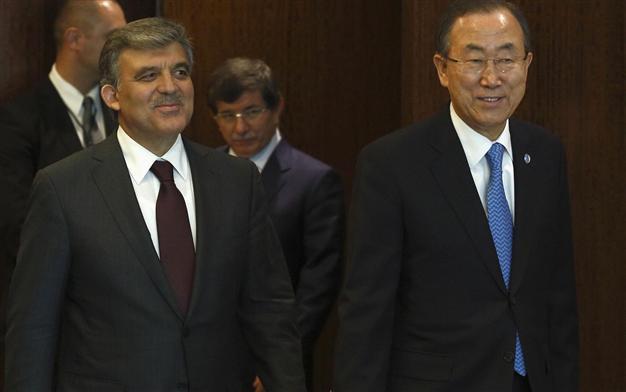Syrian chemical deal not ultimate solution to crisis, says Turkish President Gül
NEW YORK

United Nations Secretary-General Ban Ki-moon (R) walks with Abdullah Gül (L), president of Turkey, at the United Nations Headquarters in New York, September 23, 2013. REUTERS/Brendan McDermid
Turkish President Abdullah Gül has reiterated that the U.S.-Russia agreement over Syrian chemical weapons is not the ultimate solution to the ongoing crisis and President Bashar al-Assad must go.“We appreciate it. But the discussion on Syria should not be reduced only to a discussion of chemical weapons. That is not to take away from the importance of the agreement [...] The important thing is that it does not spread over too long a period of time and that there are mechanisms in place to check on progress. That is why the U.N. Security Council has to weigh in with a clear-cut mechanism with respect to this specific issue,” Gül told the Washington Post in an interview.
“If these developments regarding chemical weapons are carried out and then it is as if everything is over with respect to Syria, that would be wrong and would lead to a loss of credibility on the part of the international community. We should not say the work is done once the chemical weapons are taken care of,” he said.
When asked if Bashar al-Assad was left in power by the chemical agreement, Gül said, “That’s not something we can live with. We have to remember that when these events broke out, there was a lot of hope given to the Syrian people. The rhetoric was high, but the actions did not match the rhetoric. So far more than 100,000 people have been killed, and almost half of the population is in a refugee status. If today we say this is not our job, it is people fighting in that country among themselves, then we have to question the rhetoric at the beginning. If we leave things on their own, there is a danger that what is happening in Afghanistan will happen on the shores of the Mediterranean, and no one can tolerate that,” the president said.
“How could one contemplate him staying against the backdrop of such a bloodbath?” Gül asked concerning the fate of the embattled Syrian president.
Criticism of international community
The president also voiced criticism of the international community for failing to tackle the crisis and the rise of extremism in the war-torn country.
“There were no extremists in Syria. If things are left on their own in Syria, people will become extremists first, then radicals and then terrorists. We should have been much stronger in our reaction […] at the very beginning, but this was not done. If things go on the way they have been going, then in six months or a year from now, we will see the emergence of very well-established, well-structured groups with quite high numbers of people involved, and it will be very difficult to disperse them. Those who allow this to happen will have a burden of responsibility in terms of what happens in Syria,” Gül said, while denying accusations that Turkey was allowing aid and radicals to pass through its borders.
‘Moderates in Turkey not extremists’
“These extremists don’t come to Turkey. But the moderates — the ones who are working for democracy — meet in Turkey. We have exposed ourselves so much in helping the moderates. So if this is not appreciated for what it is and, on the contrary, we are blamed for doing something exactly opposite of what we’re doing, I see this as a pretext for people who are trying to move away from the Syrian situation,” he said.
















